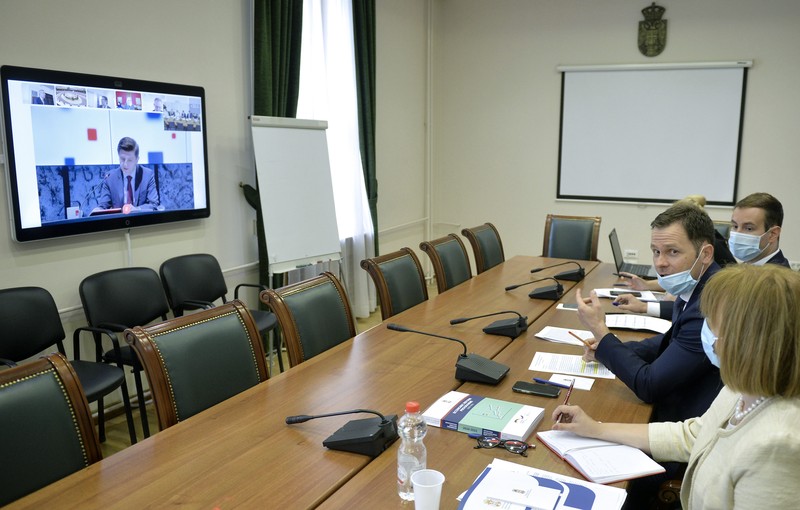Minister of Finance Sinisa Mali participated today in a ministerial dialogue between the ministers of economy and finance of the Member States of the European Union, Western Balkans and Turkey. The meeting was also attended by representatives of the European Commission (EC) and the European Central Bank.
- Serbia
Get to know Serbia
- Citizens
Culture and science
Health services
Pension and disability insurance
- Business
Employment
Economy
- Media
- Government
- Contact
Keep in touch
Keepin touch
Whether you have a question, comment, suggestion or any problem in the purview of the government, send us your message and we will try to respond as soon as possible. If your problem is not in our purview, we will forward your message to the relevant institution.
EC praises Serbia for reforms, economic measures
Economic reform programmes were presented at the meeting and the main topic was the mitigation of economic consequences of the coronavirus pandemic.
Mali stated that Serbia is fighting against the negative consequences of the current crisis, and recalled that our country has received great praise for economic reforms, especially for the results from 2019 and the measures that are being implemented.
We entered this crisis with sound public finances and enough money in the budget. We have high foreign exchange reserves, and we have had a budget surplus for four years. We have now taken measures and set aside 5.1 billion euros to help the economy and citizens, the Minister noted.
He pointed out that Serbia has shown that we are convincingly the most serious of all the countries that presented their programmes today, which is why he expects excellent results by the end of this year.
Just as the European Commission said, this crisis will have the least negative effect on Serbia. The best growth rate is expected by the end of the year, and I will remind you that at the end of the first quarter, we had a growth rate of 5 percent of GDP, while in the eurozone it fell by 3.3 percent. Other countries are far behind us, Mali said.
The Minister concluded that these results encourage us and give us the right to say that we expect the best result from all countries, not only in the region, but also in Europe.
Governor of the National Bank of Serbia (NBS) Jorgovanka Tabakovic expressed satisfaction with the assessment that in 2019 the NBS pursued a monetary policy in accordance with the inflation regime.
Inflation in Serbia is low and stable for the seventh year in a row, which is a concrete confirmation that our monetary policy is appropriate, Tabakovic said.
She recalled that the share of problematic loans has been drastically reduced, that business conditions are much more favourable, and that a healthy growth of credit activity is evident.
Serbia and the EU agreed on six recommendations regarding further mitigation of the negative impact of the coronavirus pandemic on growth and employment through adequate discretionary fiscal policy measures, support to economic recovery through increased capital expenditures aimed at growth, in terms of increased share of GDP in 2020, as well as in the medium term.
Also, an agreement was reached on improving the management of state-owned enterprises, with restructuring being one of the ways.
The recommendations are also aimed at closely monitoring the challenges to financial stability resulting from the coronavirus pandemic and taking adequate measures, providing effective, transparent and non-discriminatory support to affected companies, taking measures to preserve employment through short-term programmes and effective labour market policies, as well as improving social transfers to provide adequate support to low-income people at risk of poverty or social exclusion, the Finance Ministry said in a statement.
-
 Belgrade, 25 February 2023
Belgrade, 25 February 2023Four people die as result of coronavirus
-
 Belgrade, 12 November 2022
Belgrade, 12 November 2022Five persons die of coronavirus over past 24 hours
-
 Belgrade, 11 November 2022
Belgrade, 11 November 202260 new cases of coronavirus confirmed
-
 Belgrade, 9 October 2022
Belgrade, 9 October 20221,063 more new cases of coronavirus
-
 Belgrade, 8 October 2022
Belgrade, 8 October 202211 people die as result of coronavirus infection
-
 Belgrade, 9 August 2022
Belgrade, 9 August 2022Number of new cases of coronavirus growing
-
 Belgrade, 8 August 2022
Belgrade, 8 August 20226,498 new cases of coronavirus reported
-
 Belgrade, 7 August 2022
Belgrade, 7 August 2022More than 4,000 new cases of coronavirus in Serbia
-
 Belgrade, 6 August 2022
Belgrade, 6 August 2022Coronavirus claims 13 more lives
-
 Belgrade, 3 August 2022
Belgrade, 3 August 202217 people die as a result of COVID-19

